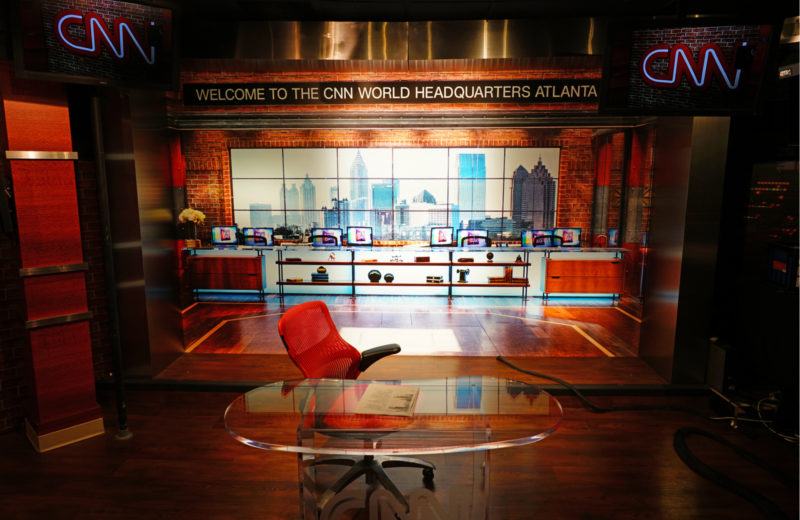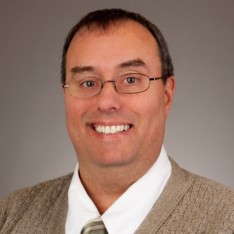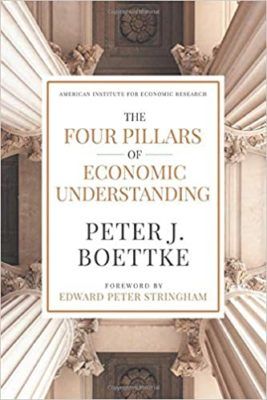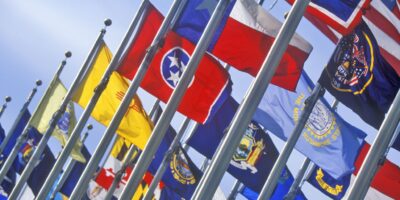A Public Choice Warning About Media

The coronavirus pandemic has placed an extreme stress test on the institutions of collective action worldwide. Some form of inattention and nonchalance was followed by panic and then a search for coordinated responses on several fronts. Even as individuals were enlisted to follow guidelines, public orders were instituted by governments throughout the globe to shut down large parts of the public (schools and libraries), private (commercial enterprises), and independent (churches) sectors. Many services and products were considered too essential to be shut down, but their production and provision practices were adjusted to the new circumstances.
For any of us paying attention, we have a front row seat to collective decision-making and its 24/7 coverage by the modern media. This includes a steady dose of what is dubbed the mainstream media, as well as alternative media, including social media. The news cycle doesn’t give much time to digest the collective action we have been witnessing, but is often a constant streaming of play-by-play analysis.
We should stop and think about what we are watching unfold before our very eyes. We have political officials (local, state, federal and international) making policy decisions. We have public health officials at all levels providing analysis on constantly changing data and projections, and thus seeking to provide up-to-date recommendations. And, we have the media reporting on this fluid situation and trying to provide stories to us that will draw us in rather than switching to Netflix or Amazon Prime, or old sporting contests that either escape our memory or whose brilliance still captures our imagination. Despite the severity of the situation, the news media is competing for our attention.
None of this is new to 2020, but is actually as old as the game of politics has been played and others tasked with communicating the results of the game to others. All that public choice analysis of collective action, or of media coverage of it, boils down to is a simple recognition that people are people. These people have aspirations and dreams; they have desires and goals; and they have purposes and formulate plans to pursue those purposes. Nothing very exotic about that. What is exotic is to assume that is true for everyone, and not just some of them. Everyone.
They are all responding to incentives and adapting on various margins to more effectively achieve their purposes and more effectively execute their plans. People as people strive to do the best that they can to achieve the goals they set for themselves. They may err in both execution and judgement, but they also learn from that failure and adapt and adjust to be less erroneous in the future. In our context, public officials, health experts, and media watchdogs are all engaged in doing their jobs as ordinary people responding to the structure of incentives that they face. We would do well to avoid invoking superhuman beings occupying these different roles, and instead just stick with the basic assumption that people are people.
When we examine the logic of purposive actors interacting within the democratic process of collective decision-making, there is a bias the system produces to concentrate the benefits of the decision on well-informed and well-organized groups, and to disperse the costs on unorganized and ill-informed others, and to do this concentrating of benefits in the short run, and dispersing of costs in the long-run. This is how we get public policies that may provide short-run relief, but cause severe long-run damage to the economic system, e.g., permanent deficit finance and accumulating public debt. But telling this story as a consequence of systemic incentives brought about by the institutions within which collective action takes place does not capture the imagination of the media nor the attention of potential viewers/readers.
Attention-grabbing headlines don’t find it compelling to identify unintended consequences, but villains and heroes. Bad people do bad things, but good people do good things — and great people do GREAT things. This is the preferred narrative, and the media fuels that. They anoint saints, and condemn devils in the public, private and independent sector. The saints must be selfless, and the devils must be self-serving.
This is the theory of social interaction we adopt early in our childhood, and eventually grow out of, though it is always lurking. It is the quintessential non-theory, theory, because it doesn’t even pretend to offer an explanation, but it’s just a pure description with names. This is particularly damaging when it comes to trying to articulate a theory of the relationship between collective action, media and improvement in political decision making, public policy implementation and improved results from actions taken in the public arena.
LSE economist Tim Besley many years ago sought to study how the media could provide the necessary information to citizens for selection of public actors, but also the appropriate feedback for these public actors to choose better and more effective policies. Mass media, he argued, was a critical tool in establishing political accountability in a democratic society. Anyone who has read J. S. Mill, let alone the U.S. Founding Fathers such as Jefferson, will find this argument compelling. A free press is a fundamental institution of a free society.
In a 2009 book, Media, Development and Institutional Change, Christopher Coyne and Peter Leeson examine the ability of mass media to affect institutional change and economic development. They show that media can both constrain the government, but also be manipulated by government to privilege the entrenched interests. If the media’s relationship to the government is structured one way, a country can experience great economic development, but if structured another way, then progress will be slow and untold suffering will be that region’s fate. Getting the media/government relationship right matters for human welfare, and yet in most times and places it is fleeting at best. Why?
The answer again is that people are people and they respond to the incentives that they face. A paper I believe to be too often forgotten was from Andrew Yates and Richard Stroup in Public Choice in 2000. The context of their paper is media coverage of EPA pesticide decisions, but the general theory is about the media effort not to merely communicate information and the feedback on policy choices in order to provide political accountability, but to draw attention of potential audiences. Fair and balanced reporting, is one implication, and may be too boring to grab the attention of the median listener/viewer/reader. Rather than nuanced and subtle discussion of trade-offs and the calm calculation of risk, we get extreme projections of nothing here or catastrophe awaits.
The problem identified by Yates and Stroup becomes even more extreme as we enter into the realm Michael Munger has identified as “truthiness.” As Munger explains, truthiness is the idea that it is acceptable to work with concepts and facts in reporting what one wishes or believes to be true regardless of whether these concepts or facts are known to be true. Once we enter the realm of truthiness, the sort of positive role that Besley or Coyne and Leeson identify for media disappears, and instead, media is just more of the noise that the powerful elites utilize to privilege themselves at the expense of others. Munger’s paper was originally published in Public Choice in 2007, and since that time the balance in media coverage between truth and truthiness has certainly pushed in the unhelpful truthiness direction.
My teacher James Buchanan used to insist as a political economist that we must begin with the here and now. We were not permitted to begin in an imaginary start state that would provide an easier transition from the current situation to a more preferred state of affairs. In our current context, we cannot wish away the virus, we cannot wish away political divisions, and we cannot wish away truthiness in journalism. We must view everything going on with realism and not romance. Public health officials face incentives in making their pronouncements. They are not necessarily untruthful, but they will be biased against committing an error of over-optimism – no forecast or treatment protocol or vaccine will be championed that underestimates the downside risk. Better for them to commit errors of over-pessimism.
There are costs to this bias in public announcements as overly pessimistic forecasts will steer policy responses, hesitation on approval for treatment protocols will produce delays and thus suffering, and the same with delays on approval of an effective vaccine. Do not get me wrong, I understand the opposite as well – an overly rosy picture painted will lead to ill preparation, too quick an approval of a treatment protocol may prove ineffective at best and downright dangerous at worse, and the same with potential vaccines. It is a very difficult job to be a public health official making the call on policies to stave off the spread of a disease whether that is the seasonal flu, HIV/AIDS or coronavirus pandemic. I certainly don’t envy Dr. Fauci or Dr. Birx, nor Fed Chair Powell or Treasury Secretary Mnuchin. There are no easy ready-made solutions to solve the problem.
This lack of certainty in the policy realm speaks to the need for more polycentricity – both in collective deliberation and in collective action. This is a lesson both Elinor and Vincent Ostrom taught throughout their long careers in political science and public administration. Precisely because incentives are tricky and the feedback loops are not as tight outside the realm of commercial calculation of profit-and-loss, there is a need for more contestation. Expertise is to be respected, but never granted monopoly privilege. And, same for the media.
Don’t expect the media to be a watchdog for accountability in its current manifestation, but instead be your own watchdog by learning to critically question the concepts and facts presented. I would argue that what is required for our current age is not a culture of skepticism of institutions – that produces truthiness – but a culture of criticism and contestation within the public, private and independent sectors so that while not providing for accountability in a strict sense would provide the useful knowledge for each of us to be effective self-governors capable of weighing our mutual obligations, manage our risk portfolio, discover the effectiveness of alternative strategies for coping with risk to our health, our families, our friends, our neighbors, and our larger communities.
Our public conversation must turn to balancing the necessary steps to stave off a public health crisis while minimizing the damage this exogenous shock has had on the personal lives of millions in their commercial and non-commercial endeavors. The creative and clever actors to populate the economy must set about using their imaginations to solve a variety of social dilemmas that this pandemic has wrought. To do so information must flow freely.
Basic public choice analysis is a critical tool in thinking through the systematic biases that will be communicated to you in the public and mass media space, and with that analytical tool in your intellectual toolkit perhaps the sorting and selecting through the noise can be done, and we discover the useful knowledge that will enable us to stumble yet see our way through to a better world of good health and happiness. Hard-nosed public choice analysis, rather than an excuse for cynicism, can become the necessary realistic basis for hope, institutional reform and human betterment.











